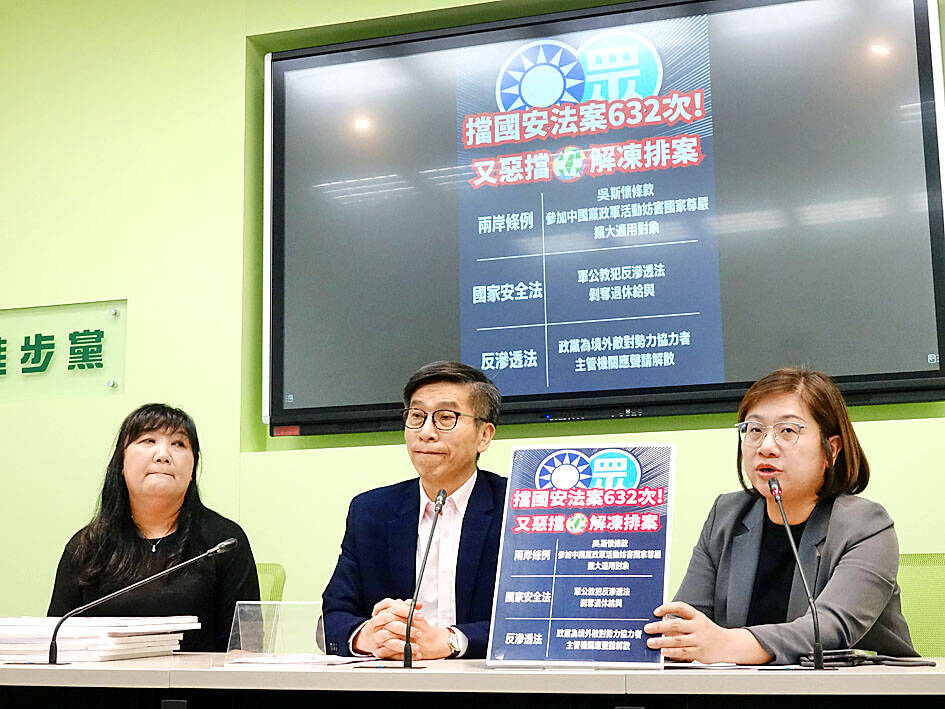The Chinese Nationalist Party (KMT) should support proposed amendments to national security laws if it believes foreign forces are attempting to interfere with elections in Taiwan, the Democratic Progressive Party (DPP) caucus said yesterday.
The call came in the wake of allegations by senior KMT member and media personality Jaw Shaw-kong (趙少康), who said that the KMT chairperson election has been the subject of an “overwhelming wave of Chinese intervention” targeting one of the candidates, former Taipei mayor Hau Lung-bin (郝龍斌).
Another candidate, Sun Yat-sen School president Chang Ya-chung (張亞中), also said that throughout the campaign, multiple artificial intelligence (AI)-generated short videos and spurious statistics have been disseminated to attack the candidates, including himself.

Photo: Tien Yu-hua, Taipei Times
DPP caucus secretary-general Chen Pei-yu (陳培瑜) said that national security bills proposed by the DPP caucus since the new legislative term began in February last year have been blocked by the opposition 632 times.
“This week, all KMT chairperson candidates and their supporters suddenly realized that “online disinformation is real, and foreign interference in Taiwanese elections is real,” she said. “Now that they recognize how much such actions harm Taiwan’s democracy and freedom, they should support proposals to amend national security laws.”
Calling out KMT Chairman Eric Chu (朱立倫), DPP caucus chief executive Chung Chia-pin (鍾佳濱) said: “The Chinese Communist Party’s interference in Taiwan’s democratic parties is a collective threat. Both the ruling and opposition parties should respond together, regardless of political affiliation.”
On Sunday, activist organization Taiwan Economic Democracy Union convener Lai Chung-chiang (賴中強) urged political parties to work together to amend the Anti-Infiltration Act (反滲透法) to combat a surge in disinformation campaigns.
“The KMT has tasted the bitter fruit of online attacks made by foreign hostile forces through fake news and AI-generated videos. We hope it recognizes the severity of the problem and takes action to help stop Chinese interference in Taiwanese politics. It is time to fix the Anti-Infiltration Act,” he said.
The act bans the dissemination of false public polls or fake news to influence elections or interfere in a political party’s primaries or nomination systems, Lai said.
“However, there are no additional severe penalties if China or any foreign hostile force were to interfere in our political parties’ elections, including for chairperson, central standing committee members and the like,” he said. “The ruling and opposition parties should together review and close the loopholes in the Anti-Infiltration Act.”
Taiwan Statebuilding Party (TSP) Chairman Wang Hsing-huan (王興煥) on Sunday said that one effective way to combat disinformation is to cut off the source of funding to sever their connections to channel their money to agents and proxies in Taiwan.
When the money flow dries up, these agents and proxies would no longer be able to create content, produce videos and circulate disinformation on social media, he said.
The TSP has long urged legislators to pass the “foreign influence transparency act,” he said.
“Only by comprehensively monitoring the money flows of Chinese-affiliated organizations in Taiwan can we immediately monitor unidentified financial flows and pre-emptively block them and shut them down,” Wang said.
“We can then halt these activities, stop the infiltration and deter their recruiting efforts in Taiwan, he said.

The manufacture of the remaining 28 M1A2T Abrams tanks Taiwan purchased from the US has recently been completed, and they are expected to be delivered within the next one to two months, a source said yesterday. The Ministry of National Defense is arranging cargo ships to transport the tanks to Taiwan as soon as possible, said the source, who is familiar with the matter. The estimated arrival time ranges from late this month to early next month, the source said. The 28 Abrams tanks make up the third and final batch of a total of 108 tanks, valued at about NT$40.5 billion

Two Taiwanese prosecutors were questioned by Chinese security personnel at their hotel during a trip to China’s Henan Province this month, the Mainland Affairs Council (MAC) said yesterday. The officers had personal information on the prosecutors, including “when they were assigned to their posts, their work locations and job titles,” MAC Deputy Minister and spokesman Liang Wen-chieh (梁文傑) said. On top of asking about their agencies and positions, the officers also questioned the prosecutors about the Cross-Strait Joint Crime-Fighting and Judicial Mutual Assistance Agreement, a pact that serves as the framework for Taiwan-China cooperation on combating crime and providing judicial assistance, Liang

A group from the Taiwanese Designers in Australia association yesterday represented Taiwan at the Midsumma Pride March in Melbourne. The march, held in the St. Kilda suburb, is the city’s largest LGBTQIA+ parade and the flagship event of the annual Midsumma Festival. It attracted more than 45,000 spectators who supported the 400 groups and 10,000 marchers that participated this year, the association said. Taiwanese Designers said they organized a team to march for Taiwan this year, joining politicians, government agencies, professionals and community organizations in showing support for LGBTQIA+ people and diverse communities. As the first country in Asia to legalize same-sex

MOTIVES QUESTIONED The PLA considers Xi’s policies toward Taiwan to be driven by personal considerations rather than military assessment, the Epoch Times reports Chinese President Xi Jinping’s (習近平) latest purge of the Chinese People’s Liberation Army (PLA) leadership might have been prompted by the military’s opposition to plans of invading Taiwan, the Epoch Times said. The Chinese military opposes waging war against Taiwan by a large consensus, putting it at odds with Xi’s vision, the Falun Gong-affiliated daily said in a report on Thursday, citing anonymous sources with insight into the PLA’s inner workings. The opposition is not the opinion of a few generals, but a widely shared view among the PLA cadre, the Epoch Times cited them as saying. “Chinese forces know full well that